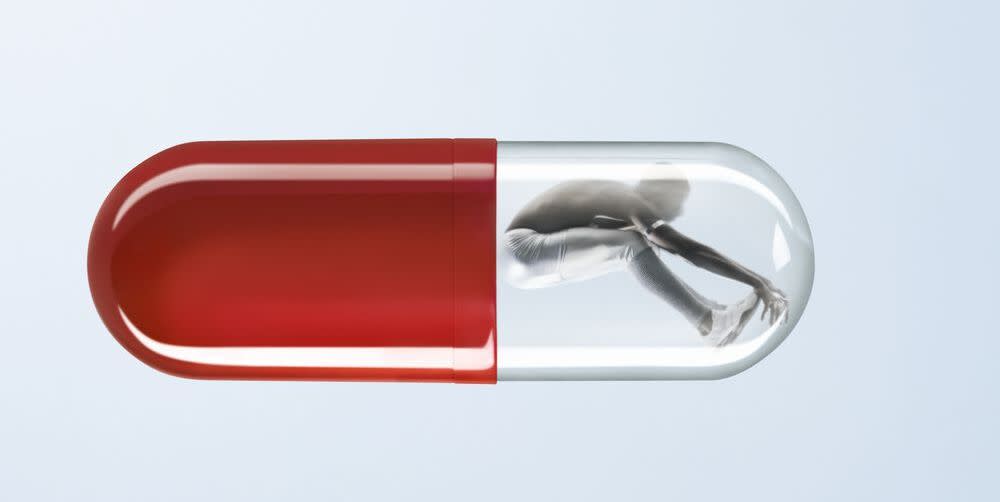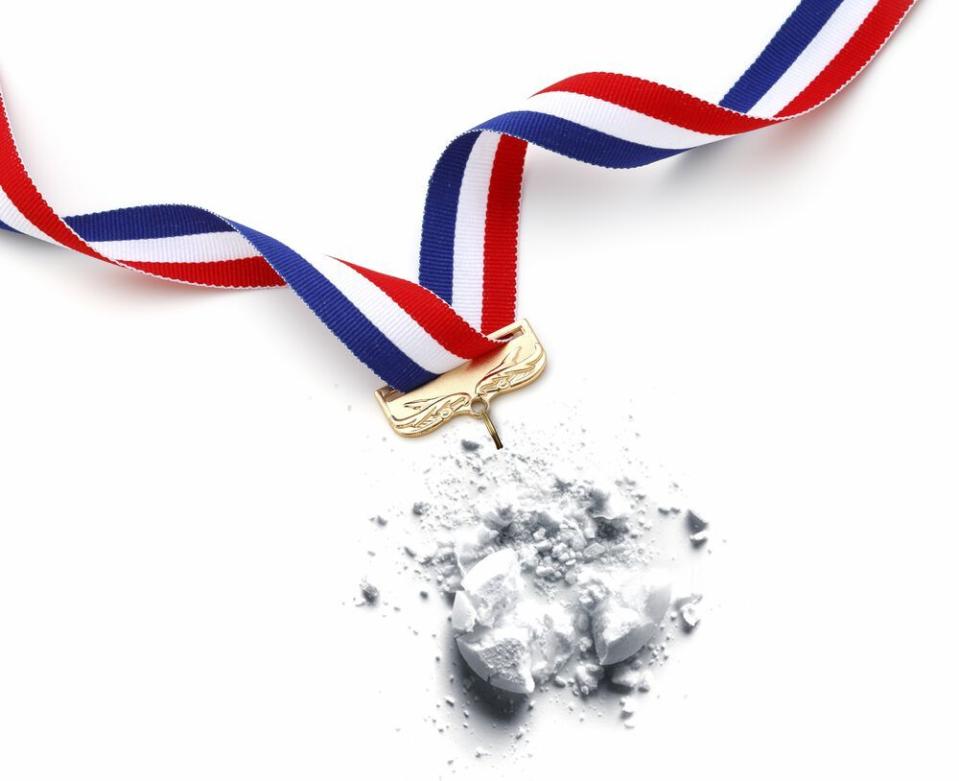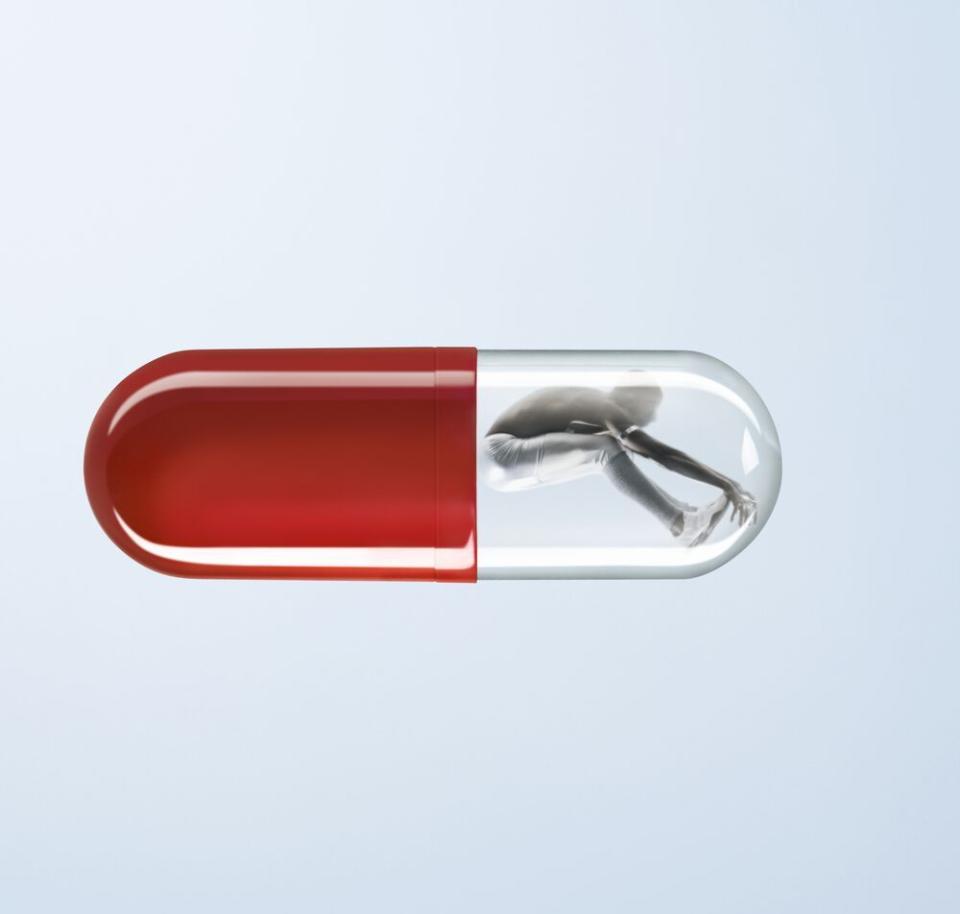The ‘Steroid Olympics’: Inside the PED-Friendly Enhanced Games

A billionaire-backed, drugs-friendly sporting event is gaining prominence. But while critics argue the Enhanced Games is farcical and dangerous, its founders view the employment of PEDs in world-class sport as an inevitability. Who’ll get the last laugh?
What are the Enhanced Games?
Before Rio it was Zika. Before Tokyo it was Covid. Now, on the eve of the Paris Olympics, a new phenomenon has been threatening to pilfer headlines and column inches from this summer’s 33rd Olympiad.
The premise of the Enhanced Games is simple: what if, instead of banning performance enhancing drugs (PEDs), they were simply regulated? How much faster, stronger and fitter would the world’s best sprinters, weightlifters and fighters become on a controlled regimen of pills and injectables?
Backed by PayPal co-founder Peter Thiel and the subject of a co-produced docuseries by Rob McElhenney’s and Ridley Scott’s production companies, the inaugural Enhanced Games has been rumoured to make its bow in the summer of 2025 – although, the live date will depend on some ‘big format details’, which the team are working on, according to a spokesperson.
Billed as an annual event, entrants in five sports – track and field, swimming, gymnastics, weightlifting and combat sports – will be permitted to dope in training and competition.
‘Well it’s bollocks, isn’t it?’ was the flippant response from head of World Athletics, Lord Sebastian Coe. Travis Tygart, head of the US anti-doping agency (USADA), called it ‘farcical… likely illegal in many [US] states’ and ‘a dangerous clown show, not real sport’.
With a prize pot of $1 million for every record broken, James Magnusson was the first former Olympic athlete to publicly sign up for the spectacle. ‘I’ll juice to the gills and break it in six months,’ was the Australian swimmer’s headline-grabbing come-get-me plea. The concept is polarising, to say the least.
Aron D’Souza, the Australian-born entrepreneur behind the project, believes he’s liberating the Olympics from its draconian doping laws – rules a 2011 WADA-commissioned study found are already being circumnavigated by 44% of elite athletes, he says.
Rather than suppressing PEDs, D’Souza says we should embrace them and advocate for transparency – for the good of scientific progress. In his view, ‘the enhanced movement is inevitable’. So what does humanity have to lose – or gain – from a ‘drug-friendly Games’?
What Is the Purpose of the Enhanced Games?
D’Souza’s argument is two-fold. He says that doping is already widespread, unregulated and dangerous, and that athletes are being taken advantage of, with most living under the poverty line, while bureaucrats ‘fly around the world in private jets’.
‘One of our core principles is we want to make our athletes as rich as possible,’ he tells MH when we meet at the Enhanced Games’ HQ, a private member’s club off Kensington High Street. Along with the $1 million prize pot, the an undisclosed – but supposedly generous – base salary has been tabled for all those taking part.
In answer to criticisms around pay, World Athletics has since revealed it will become the first sport in the 128-year history of the Games to offer prize money for a gold medal. All 48 winners in Paris stand to receive $50,000 (£39,800) from the sport’s governing body, with cash prizes for silver and bronze medallists inked in for the 2028 Games in Los Angeles.
In March, WADA members condemned D’Souza’s plans as dangerous and irresponsible. ‘The health and well-being of athletes is WADA’s number-one priority,’ a statement read. ‘Clearly this event would jeopardise both by promoting the use of potentially harmful substances and methods.’
Despite these headwinds, fame – or infamy – as well as fortune is on the line. Yet, at the time of writing, while the likes of Adam Peaty and Max Whitlock are securing their berths for Team GB, only Magnussen is publicly signed up to the Enhanced Games. D’Souza, however, is adamant his show will boast an all-star cast.
‘We’ve had thousands of athletes reach out to us – dozens, maybe hundreds of Olympians within medal contention,’ he claims. He expects more to come forward on 12 August, the day after the Olympics closing ceremony, and the first day of Enhanced Games qualification.
If anyone from the Olympics does break ranks, the ramifications are serious and potentially permanent. ‘If you are going to partake in that activity, you shouldn’t be involved in any sport ever again,’ was the frank response from World Aquatics chief Brent Nowicki. ‘Once you have crossed that bridge, there is no coming back.’
The stakes are equally high for D’Souza and co-founder and heavyweight investor Christian Angermayer. In their utopian vision, a pro-doping Games would pave the way for scientific breakthroughs that could benefit mankind at large, as well opening the door for lucrative pharmaceutical endorsements.
Angermayer – a billionaire whose two passion projects are psychedelics as medicine and ‘treating ageing as a curable issue’ – hopes the Enhanced Games could one day rank in the collective memory ‘alongside the first moon landing or pig heart transplant’.
In D’Souza’s view, ‘natural sport has reached its peak.’ Patriotism, he says, is also a ‘dying commodity’. At the Enhanced Games, athletes won’t be competing for their country but rather for humanity at large.
‘There are no nations at the Enhanced Games. We want to illustrate a whole new form of humanity. Can we unite around the concept of a super-humanity, where we can overcome our biological flaws? Can we make that a reality? Isn’t that something we could rally behind?’
Future iterations of the Games could even pit man versus machine. ‘The future for us is not just pharmacological enhancements, but also engineered enhancements. It’s about brain computer interfaces and gene editing. I know this sounds like science fiction, but AI was science fiction just five years ago. And it’s here today.
‘Anyway,’ he adds. ‘Why would anyone want to watch the old, slow Olympics, when you can watch the fast, modern Enhanced Games?’
What Are the Dangers of the Enhanced Games?
The backlash against the The Enhanced Games has been predictably fierce. Several high-profile athletes have publicly condemned the proposals, including men’s 800m world record holder David Rudisha and six-time Olympic medal winning cyclist Anna Meares.
Several more refused to be quoted on the record for this article for fear of recrimination by association. Among their chief concerns, they worry that young athletes will risk being ostracised by both their sport and their sponsors.
Moritz ‘Mo’ Fürste is another former Olympian and two-time gold winner in field hockey for Germany (2008 and 2012) who finds the whole project laughable. ‘If you offered $1 million to anyone willing to cut off their leg I’m sure you’d find a few candidates,’ he tells me on a video call from Hamburg. ‘I find it all quite amusing’.
Since hanging up his hockey stick Fürste has co-founded Hyrox, the world series of fitness racing. His perspective is informed by both his past as an elite athlete, and his present role as an entrepreneur who has to grapple with the threat of doping. (Hyrox is due to start screening pro athletes for banned substances at the upcoming World Championships.)
The reason we’re even having this conversation, he says, is because the current penalties and deterrents meted out by WADA for ‘cheating’ are not punitive enough. Testing is what he calls a ‘reactive control system’. Drug makers and users will always be one step ahead.
That’s not to say testing isn’t comprehensive. When he was competing, he and his teammates had to document exactly where they would be sleeping for 90 days in advance. Any deviation would have to be reported. Then there were unannounced tests every 4-8 weeks. Miss three tests and you’re as good as a drug cheat.
He followed this strict protocol for a decade, and only heard of one positive test among his peers when a British field hockey player – and 1994 gold medal winner no less – tested positive for cocaine.
Was he ever approached to take PEDs? ‘Only once,’ he tells MH. It was when he was training for a reality TV show after he had finished his career. ‘The gym owner asked if I wanted to take stuff to help get in shape. I was really surprised. But we had a nice conversation and I happily declined.’
While Fürste wasn’t tempted, he knows many others will be. ‘For $1 million you will find a lot of people willing to do some scary stuff.’
Does he fear it could set a dangerous precedent for everyday athletes? ‘Yes,’ he says. ‘There’s a huge risk. It could encourage people to start using PEDs from a young age.’
On safety, D’Souza is bullish. ‘I’ll be very clear,’ he says. ‘The Enhanced Games aims to be the safest sporting event in history. Forty-four percent of athletes are already using banned performance enhancements underground, injecting themselves in their garage without clinical supervision. By shining a light upon darkness, you will always be safer.’
When I counter that safety can’t possibly be ensured in a combat arena, where breaking bones, rather than records, is a more likely outcome, D’Souza is unmoved.
‘Performance enhancements are a bit of a misnomer,’ he says. ‘Most banned enhancements are actually for recovery, not for strength. So by boosting recovery we’re actually going to increase career longevity and capabilities, particularly in combat sports.’
Fürste is sceptical that the Enhanced Games’ liberal approach to drug taking and year-round health screening could make sport safer.
‘What they are saying is so naive,’ he continues. ‘Are they going to test thousands of athletes several times a year? When I was competing we would have really thorough health performance checks twice a year. We checked literally everything. We were there for two days. That’s already happening so calling it safer is a joke.’
Will the Enhanced Games Drugs Test?
Internally, as well as externally, doubts have started to surface. Professor Dr Michael Sagner, a specialist in longevity medicine, recently appointed to the Enhanced Games’ scientific and medical commission, says he has repeatedly butted heads with D’Souza.
The commission is meant to stand independently, while ensuring athlete safety. But, having learned several members have stock options in the company, Dr Sagner has demanded their removal, along with a provocative statement on its website that reads: ‘Sports can be safer without drug testing.’
‘It makes no sense,’ he says, pointing at the sentence on his computer when I meet him at his private practice on London’s renowned Harley Street. ‘We asked for this to be removed like 50 times.’
On the contrary, Dr Sagner says he wants the Enhanced Games to be ‘the most tested event ever’ and is working to develop sophisticated testing protocols that will make the inaugural event viable.
‘Using performance enhancing drugs is actually a lot safer than people think,’ he continues, pointing to the fact caffeine was banned by WADA up until 2003, and that anabolic steroids, a Class C drug, are technically legal for personal use in the UK when prescribed by a clinician.
Yet, he says, because PEDs are branded as ‘dirty’ and dopers as ‘cheats’ they aren’t being used safely. With the Enhanced Games serving as a vehicle for PEDs to be scrutinised and researched properly, he hopes this will change.
Since his name has been attached to the project, however, he tells me he’s received anonymous emails from people threatening to report him to the British Medical Association. As a practising clinician, he has a lot to lose. His credibility. His licence. Is it all worth it?
‘I don’t know,’ he says, sounding shaken. ‘I’ve never received a single complaint from thousands of patients.’
One outcome, he concedes, could be that ‘we realise we don’t need PEDs, that their benefits have been overestimated’. He’s also dubious that an enhanced regime will help Magnusson break any world records. ‘If he thinks there’s a magic pill out there that’s going to give him a world record, well, he’s not very well educated.’

Who Will Enter the Enhanced Games?
For Magnusson – the only confirmed Enhanced Games athlete to date – the event also represents a second chance, an opportunity to test the limits of his potential, and put his older, wiser 33-year-old head on his more robust 20-year-old body.
‘This pursuit actually makes that a genuine possibility,’ he tells MH from his home in Sydney’s Bondi Beach. A two-time Olympian, ‘The Missile’ narrowly missed out on gold in London by one-hundredth of a second. And with a time of 47.10 he’s the fifth fastest man to ever swim the 100m freestyle.
As the poster boy for the world’s first ‘Steroid Olympics’, Magnusson knows he’s shouldering a lot of the burden. But he hopes that lessons could be learned at the elite level that will trickle down to benefit everyday people.
Signing up for the Enhanced Games also means he can race in the polyurethane ‘super-suits’ that were banned in 2010, after 29 new records were set at the World Championships in Rome. At the inaugural event, Magnusson will be gunning for Brazilian César Cielo’s 50m freestyle world record of 20.91, set a month before the suits were outlawed.
‘We’re going to resurrect these suits and finally compare apples with apples for the first time in 15 years,’ he says. The former 100m freestyle world champion (2011 and 2013) is also taking a ‘completely different’ approach to his training, focusing on short and explosive efforts for the shorter distance event.
‘And then of course we have the enhanced aspect,’ he says, ‘which is going to allow me to stack workouts so I can recover faster and train at a higher intensity more often. I’m not expecting to dive in the water and feel like Superman straightaway.’
For now he says he’s ‘completely natural’. ‘The first step will be to get back to my peak physical condition naturally. I’ll then sit down with the doctors to perform a complete analysis of all my biomarkers to see what’s suboptimal and what we can enhance to function at its highest possible output.’
There’s not going to be any guesswork, he says. ‘I’m not going to just throw a bunch of supplements at a wall and see what sticks. If at any point there’s any adverse side effects then we pivot to other options and keep doing this as safely as possible.’
Rather than ‘guinea pig’, Brett Fraser, the Enhanced Games’ chief athletes officer, prefers to think of Magnusson as a ‘pioneer’. A former elite swimmer who appeared in three Olympics for the Cayman Islands, he’s certain that the medicine developed via the Games will one day help ‘prolong life, prolong health, sustain and increase happiness and develop tech for athletes and the human race in general’.
And yet, at just 34, he’s coy on whether he would take another stab at his event, the 200m freestyle. ‘Maybe,’ he says. ‘I would like to understand more about non-invasive PEDs first.’
Angermayer, on the other hand, freely admits he’s following an ‘enhanced regime’, though will only reveal he’s taking Ozempic for weight control and training in a high altitude chamber for cardiovascular gains.
D’Souza, meanwhile, is adamant that he’ll be in the starting blocks from day one. ‘Oh, I’m definitely getting enhanced,’ he says, eyes lighting up. ‘I can’t wait. I want to compete. I want to see what I’m capable of.’
So what might an ‘enhanced regime’ involve? TRT is frequently alluded to by D’Souza and Magnusson. It’s a telling example because, for all its promise to increase bone density, muscle mass and insulin sensitivity in some men, its long-term risks and benefits remain unknown due to a lack of large clinical trials.
Currently TRT is only prescribed by doctors if a patient presents with symptoms of low testosterone, like a low libido, low sperm count or loss of muscle mass, and only to achieve normal levels. For those showing no symptoms, treatment isn’t recommended. Side-effects range from a rash or irritation to an elevated risk of prostate cancer, heart attack and stroke.
Are the Enhanced Games Fair?
Scratch under the surface, and the Enhanced Games is full of contradictions. Its website suggests that ‘Sport can be safer without drug testing.’ Yet D’Souza insists athletes will be tested and screened year-round to ensure doping doesn’t jeopardise health.
‘We don't want an athlete to have a heart attack on international television,’ D’Souza has previously quipped. ‘That would be terrible for us. And the athlete of course.'
The Enhanced Games will ensure a level playing field, bringing doping out of the shadows and into the open, Fraser repeatedly tells me on our call. Yet, at the same time, athletes aren’t required to reveal what they’re taking. ‘My body, my choice,’ says D’Souza.
And what of legacy? Magnusson insists a doping-friendly Games won’t result in starry-eyed kids thinking they’ll have to, in his words, ‘juice to the gills’ to be competitive. Kids can be inspired by the dedication and sacrifice shown by an MMA athlete, he says, but that doesn’t mean ‘you then go to school and kick another child in the face’.
And yet, amid the hyperbolic statements from the Games’ leading protagonists, and the dismissive retorts from the likes of Lord Coe, it’s noticeable that nobody from WADA to the IOC has outlined exactly why they object so vehemently to the Enhanced Games project.
One nation’s anti-doping agency insinuated that they would rather not fan the flames of publicity, or grant the project legitimacy. But whether they like it or not, the Enhanced Games is coming. LA, Las Vegas and Miami – ‘alongside many others, in the US and beyond’ – have been mooted as potential host cities.
Perhaps it will crash and burn on Netflix, collapsing under its own hype like 2017’s infamous Fyre Festival. But it also might usher in a new era of sport and science as entertainment, with past and present athletes putting their bodies – and long-term health and reputations – on the line.
Maybe this high-stakes thought experiment will pave the way for new pharmaceutical-grade, FDA-approved drugs like Ozempic and Wegovy, formulations that allow us to train harder, recover faster and live longer. But any athlete that signs up will undoubtedly be making a huge gamble – and no enhancements will aid their rehabilitation if it doesn’t pay off.
Does Professional Sport Have a Drugs Problem?
Performance-enhancing drugs may be prohibited in professional sport, but they have a decades-long history. Here are five of the most infamous cases.

East Germany, 1970s-80s
To promote the cause of communism, 9,000+ athletes were forced to take steroids, leaving many with lifelong health problems including heart disease, infertility and cancer.
Ben Johnson, 1988
Clocking a world record of 9.79 seconds in the Olympic 100m final in Seoul, edging out great rival Carl Lewis, the Canadian sprinter later tested positive for the steroid stanozolol.
Festina Cycling Team, 1998
The team’s masseur was busted transporting amphetamines, EPO and steroids on the eve of the Tour de France. The scandal led to the creation of WADA in 1999.
Marion Jones, 2007
Admitted using steroids supplied by the Bay Area Laboratory Co-operative (BALCO) and surrendered the three golds and two bronze medals won at the 2000 Olympics.
Lance Armstrong, 2012
After years of denials and accusations from former teammate Floyd Landis, the American cyclist and cancer survivor admitted to doping for all seven of his Tour de France wins.
What Substances Could Be Used at the Enhanced Games?
Professor Dr Michael Sagner details the PEDs that could be in play at the Enhanced Games. Note: without medical supervision and clinical testing, taking any form of PED can be dangerous.

Testosterone
WADA - Prohibited at all times
‘TRT will likely form the foundation of most enhanced programmes for men and women.’
Anabolic steroids
WADA - Prohibited at all times
‘First synthesised in 1935, these hormones mimic testosterone to regenerate tissue.’
Human growth hormone
WADA - Prohibited at all times
‘Human Growth Hormone (HGH) promotes tissue regeneration, Erythropoietin (EPO) boosts red blood cells for aerobic exercise.’
Narcotics
WADA - Prohibited in-competition
‘Common in contact sports, opioids act as antidepressants to help reduce pain.’
Stimulants
WADA - Prohibited in-competition
‘Prevalent in sports requiring bursts of high-energy activity, like sprinting and weightlifting.’
Beta blockers
WADA - Prohibited in particular sports (including archery, shooting and golf)
‘Lowers heart rate and reduces symptoms of nervousness and anxiety.’
Cannabinoids
WADA - Prohibited in-competition (though CBD is exempt)
‘Commonly used medicinally for mental relaxation and pain reduction.’
Gene transfers
WADA - n/a
‘Could enable athletes to enhance their physical capabilities genetically – risks unclear.’
You Might Also Like


